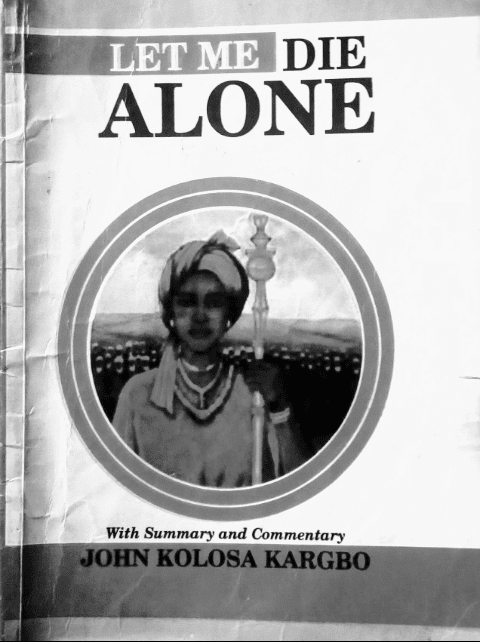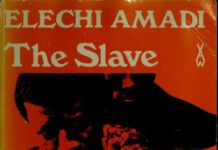Some of the themes in Alex Agyei-Agyiri’s Unexpected Joy at Dawn include the theme of xenophobia, the theme of alienation, the theme of separation, the theme of love, the theme of religion intolerance and the theme of identity crisis.
Other themes in Unexpected Joy at Dawn are insecurity, pan-africanism, death, ethnic prejudice and re-union. Now, let’s look into each of these themes.
(1) THEME OF XENOPHOBIA
Xenophobia is one of the most significant themes in Unexpected Joy at Dawn.
Oxford Advanced Learner’s Dictionary (8th Edition) defines xenophobia as “a strong feeling of dislike or fear of people from other countries.
In the text, citizens and governments of both Nigeria and Ghana are not comfortable with other country’s nationals in their country. The Bank Manager of Expense Bank does not hide his dislike for Nii Tackie whom he sees as a Nigerian living off the wealth of Ghana. He goes to the extent of saying that if given the power, he would gladly sack all the “aliens” working in the bank.
The Bank Manager’s wish though not fulfilled is already in motion outside the bank. Ghanaians are already hitting out on Nigerians living in Ghana. This is further confirmed by newspaper reports as related by an immigration officer during the screening of Mama Orojo’s luggage in the airport on her way to Accra and also by Nii Tackie’s sudden consciousness of his tribal marks.
And in Nigeria, there is expulsion of aliens from the country; mostly Ghanaians. The Ghanaians are clearly doing well in Nigeria before the alienation policy is introduced. They work in banks, schools, and construction companies. But immediately the new immigration policy is introduced, their Nigerian employers subtly collect their residents’ permits and destroy them.
Idem’s expression in Chapter 8 (Part 1) of the text, “Omo Ghana no go go oo”, underscores the attitude of many Nigerian citizens to Ghanaians; whether legal or illegal immigrants.
(2) THEME OF ALIENATION
Also rife in the novel is the theme of alienation. And it cuts across the both countries.
Some fifteen years earlier, Ghanaian government introduced an alienation policy which eventually led to mass exodus of other countries’ nationals from Ghana; and the separation of families. This led to the separation of Mama Olu Orojo and her parents from her kid brother, Moses Nii Tackie.
Some fifteen years after this incident, Nigeria introduces a similar policy which culminates into tensed atmosphere in both Nigeria and Ghana.
While Ghanaian alienation policy separates Mama Orojo and Nii Tackie, the Nigerian alienation brings them together after fifteen years of separation.
(3) THEME OF SEPARATION
Unexpected Joy at Dawn is premised on the separation of two siblings and the efforts from both sides to reunite.
Nii Tackie is separated from his family by the Ghanaian alienation policy at a very tender age.
As a result, it takes fifteen years to re-unite with his sister, Mama Orojo, under the least expected circumstance.
Also, Nii Tackie and Massa are separated by Massa’s death.
(4) THEME OF LOVE
Nii Tackie and Massa are our ideal love birds in this text. They so much love each other that each understands the other already.
For example, when Massa downplays her pain, Nii Tackie knows already that she is lying and only wants him to feel relieved. Massa too, despite her sickness, is quick to notice that Nii Tackie has become conscious of his tribal marks.
Another category of lovers in the novel are Joe and Mama Orojo. Their relationship belies the cat and dog relationship between their two countries. It is refurbished with love the two countries lack.
The love is so strong that Mama Orojo is ready to forgo her respected position in the local Corpus Kristi and risk being excommunicated from Amen Kristi just to marry Joe.
Idem and Wachuc are another category of lovers. Through Idem’s nagging, one can see a woman’s love and concerns for her husband.
(5) THEME OF RELIGION INTOLERANCE
The reader first has a glimpse of religion intolerance in Chapter 2 (Part 1) of the text during Mama Orojo’s and Ibuk’s evangelical mission in Illere, Nigeria.
It is made obvious that many people they preach to show little interest because the Sahm brotherhood frowns at preaching to their people and they do not want any of their people to have anything to do with the preaching.
Tom Monday is also worried about his daughter’s religion extremism and intolerance; something he attributes to her marriage to a man of the Sahm, a politico-religious brotherhood.
Religion intolerance reaches its peak in Chapter 13 (Part 2) while members of Amen Kristi Church are on an evangelical mission in Egba. It culminates into violence.
Earlier on in Chapter 19 (Part 1), the narrator has foreshadowed this purported violence; mildly put as the intent to “stop the Amen Kristi’s evangelical mission” by elements who feel threatened by the encroaching Christianity.
The violence costs the lives of Paleo’s wife, Ibuk and others; wounds several; and destroys valuable properties. It is perpetrated by members of the Sahm Brotherhood.
(6) THEME OF IDENTITY CRISIS
Identity crisis is another significant theme in the novel.
Moses Nii Tackie, though of Nigerian parentage, is born and bred in Ghana. He bears a Ghanaian name. He has lived all his life in Ghana. He has his education up to the university level there too. So, he qualifies as a Ghanaian citizen and is thus a citizen by birth.
However, he is not accepted as a Ghanaian citizen on the account of his tribal marks. So, in Ghana, the place of his birth and Mama Orojo’s “second home”, he is as alien as every other Nigerian and foreigner.
Nii Tackie migrates to Nigeria high with hope that he would be accepted in Nigeria.
While his tribal marks shows he is of Nigerian nationality, his mannerisms, accent and inability to speak any Nigerian indigenous language betray him for a Ghanaian. Rather than gain acceptability, he is treated like every other alien and put to modern slavery to save himself from being imprisoned.
The twist in this is that Nii Tackie is not accepted as a citizen of either country. In Ghana, he is seen as a Nigerian. In Nigeria, he is seen as a Ghanaian. Under normal circumstances, he is a citizen of both countries; Ghanaian by birth and Nigerian by ancestry.
(7) THEME OF INSECURITY
There is insecurity in both countries.
You will recount we’ve looked into the religious attack on Amen Kristi evangelical mission team which leads to the loss of several lives and properties.
There is yet another pointer to insecurity in Nigeria. In Ijase community where Mama Orojo lives, there are incessant robbery cases. People are killed as they are robbed of their properties.
In Chapter 15 (Part 2), the narrator hints us with the method the vigilantes devise in dealing with robbery “suspect”. They tie car tyres around suspects and set them ablaze. This in itself manifests lawlessness and violence.
In the opening chapter of the novel, the narrator also depicts the theme of insecurity with bullets flying on Accra streets in probable clash between a gang of armed robbers fighting among themselves over some spoil, or the security agents rounding up some thugs.
From Nii Tackie’s reaction to this incidence and the use of the word “again”, it is apparent that gang fights, police raids and insecurity in its entirety have become a commonplace in Ghana.
(8) THEME OF PAN-AFRICANISM
The narrator extols the values pan-africanism through the ailing Massa. She is not only a true Pan-African but one who encourages others around her to let go of their ethnic/national prejudice.
This is demonstrated in how she frowns at Nii Tackie’s intent of going to Lagos and also in how she soothes Nii Tackie with words when the latter becomes conscious of his tribal marks and consequently his alien status in Ghana.
Massa epitomises pan-africanism. Against all odds, she believes in the African shared brotherhood, collectiveness, and holds on to the belief that anywhere (in Africa) where one finds peace is one’s home.
In other words, she does not believe in the ethnic-country divides. For her, we are Africans before any other thing.
It is this light that her country, Ghana, and Nigeria close their eyes to.
(9) THEME OF DEATH
The death of Kantamanto Market which used to be a point of convergence for people of different ethnicities and nationalities signals the death of a Ghanaian society that welcomes foreigners with open arms. The decaying corpse at Korle Lagoon and the ailing Massa with aura of death over her also symbolise Ghana at its decay, an ailing country.
There are multiple deaths in the text.
To start with, we witness the death of Massa; the death of the fat woman at Makola market; the suicidal death of Marshak; the death of Ibuk and several others in Sahm-instigated religious violence; Tally O’s brutal murder in the mines; and the death of Aaron in the concluding part of the novel.
(10) THEME OF ETHNIC PREJUDICE
The members of Corpus Kristi do not want Mama Orojo to marry Joe on the premise of flimsy ethnic prejudice.
They would rather have her marry Tom Monday, a Nigerian, than to marry Joe, a Ghanaian.
The chairman, speaking for the majority, hints on Mama Orojo’s removal from the Corpus Kristi and a probable excommunication from Amen Kristi if she marries Joe.
(11) THEME OF RE-UNION
In the beginning of the text, Mama Orojo has been separated from her brother for about fifteen years when she was eighteen.
Mama Orojo now in her thirties, successful and accomplished, seeks a re-union with her brother.
As the plot unfolds, she travels to Ghana to look for her brother. In the process of doing so, she is introduced into the gold business and, she and Joe become lovers.
With the help of Joe, she searches for Nii Tackie. But her search gets to a dead end when she is told Ni Tackie has gone to Nigeria. Mama Orojo returns to Nigeria all hope lost.
After the death of Massa, Nii Tackie travels to Nigeria to seek out his sister. In Nigeria, he is caught in the web of the new immigration law and the enormous Lagos.
However, fate reunites them against all odds at the break of dawn.
Other themes Unexpected Joy at Dawn is replete with are hope, care, perseverance, prostitution, famine, economic depression and political upheaval.
 WHATSAPP: Click HERE to join the new Literature PADI WhatsApp group to receive latest updates on your phone and for further literary discussions!
WHATSAPP: Click HERE to join the new Literature PADI WhatsApp group to receive latest updates on your phone and for further literary discussions!










This is so explanatory thanks so much
Thanks for the Themes,they are very important
This is a self explanatory write up kudos to you ✌️
You explained it to much. Just a couple of sentences would do (3 to 5 sentences)
Wow! Very necessary and important, Thanks for the info.
Great work. More grease to your Elbow.
Permission to use this as class material pls
Permission granted. I wish your students the very best.
Please what about the theme of pan-africanism
Pan-Africanism is one of the themes conveyed in Unexpected Joy at Dawn. Massa embodies this theme with her concept of “anywhere and place in Africa is one’s home.”
The book is great
This is really helping me in my exams
Am glad
I hope to use this to revise with my students. The material is relevant and on point. Thanks Mr Ridwan!
Why is there no theme of curruption on this page
We obviously can’t discuss all the themes present in the text. You can add yours too. That’s what the comment section is meant for.
Please I was ask to write on 4 thematic preoccupation pin pointed by Alex agyesis in the novel unexpected joy at down, is it the same with those theme listed above ……
Yes.
Comments are closed.